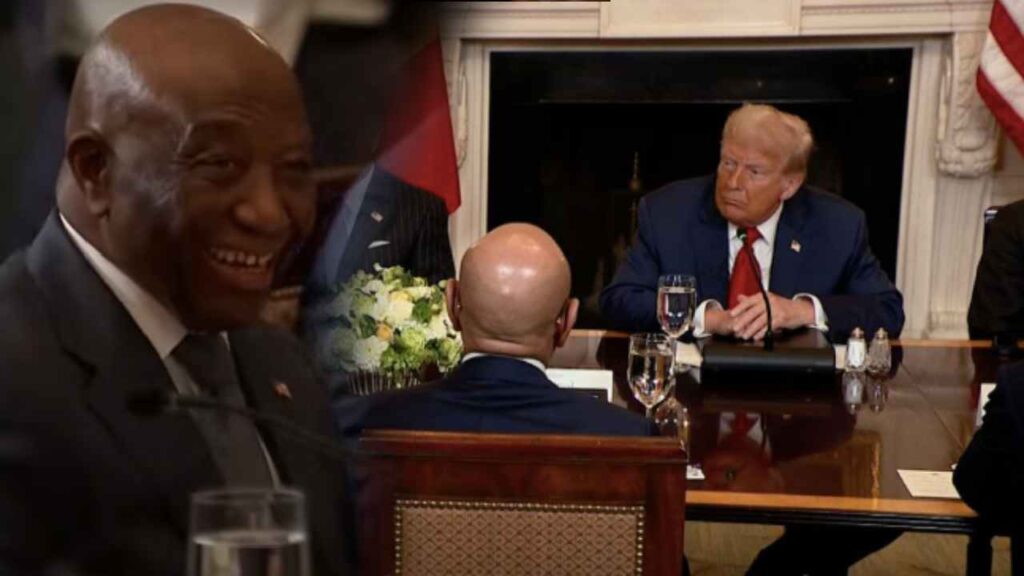President asks where Joseph Boakai learned to speak “so beautifully” despite English being Liberia’s official language
Published on otatso.uk
Table of Contents
- The Controversial Exchange
- Historical Context
- African Response
- Official Responses
- Pattern of Behavior
- Controversial History with Africa
- The Broader Meeting

US President Donald Trump has drawn criticism across Africa after praising Liberian President Joseph Boakai for his “good English” during a White House meeting with five African leaders on Wednesday, seemingly unaware that English is the official language of Liberia.
The exchange occurred as Trump hosted leaders from Gabon, Guinea-Bissau, Liberia, Mauritania, and Senegal at the White House, where he outlined his administration’s shift from aid to trade with African nations.
The Controversial Exchange
When President Boakai took the microphone to express Liberia’s support for Trump’s “making America great again” policy and advocate for US investment, Trump was clearly impressed with his language skills.
“Such good English, it’s beautiful. Where did you learn to speak so beautifully?” Trump asked the Liberian leader.
Boakai seemed to chuckle at the question before informing Trump that he was educated in Liberia. “In Liberia?” Trump responded with apparent surprise. “Yes sir,” Boakai confirmed.
“That’s very interesting,” Trump said. “I have people at this table who can’t speak nearly as well.”
Historical Context
The comment has particular significance given Liberia’s unique history. The country was founded in 1822 by the American Colonization Society as a colony for free Black Americans – a project conceived by white Americans trying to address what they saw as the future for Black people in the US once slavery ended. Liberia declared independence from the American Colonization Society in 1847, and while multiple indigenous languages are spoken there, English has remained the official language.
African Response
The president’s remarks have prompted widespread criticism across Africa, with many viewing the comments as condescending and reflective of outdated stereotypes about the continent.
“I felt insulted because our country is an English-speaking country,” Archie Tamel Harris, a Liberian youth advocate, told CNN. “For him to ask that question, I don’t see it as a compliment. I feel that the US president and people in the west still see Africans as people in villages who are not educated.”
A Liberian diplomat, speaking anonymously, described the comment as “not appropriate” and “a bit condescending to an African president who’s from an English-speaking nation.”
South African politician Veronica Mente questioned on social media platform X: “what stops [Boakai] from standing up and leav[ing]?”
Official Responses
The White House has defended Trump’s statement, with officials characterizing it as a compliment rather than an insult.
“I was in the meeting and everyone was deeply appreciative of the President’s time and effort. The continent of Africa has never had such a friend in the White House as they do in President Trump,” said Massad Boulos, the Trump administration’s senior advisor for Africa.
White House deputy press secretary Anna Kelly described Trump’s comment as a “heartfelt compliment” and suggested that “reporters should recognize that President Trump has already done more to restore global stability and uplift countries in Africa and around the world than Joe Biden did in four years.”
Liberia’s Foreign Minister Sara Beysolow Nyanti offered a more diplomatic interpretation, telling CNN that “there was no offense” from the Liberian president’s perspective. She explained that “what President Trump heard distinctly was the American influence on our English in Liberia” and that he was “just recognizing a familiar English version.”
Pattern of Behavior
This incident follows a pattern of Trump making similar comments about leaders’ English language abilities. During a recent press conference with German Chancellor Friedrich Merz, Trump complimented his “good English” and asked if it was as good as his German.
The US president has also centered the English language as part of his “America First” platform, asserting during a 2015 presidential debate that the US is “a country where we speak English.” In March, he signed an executive order making English the official language of the United States.
Controversial History with Africa
Trump’s relationship with African nations has been marked by controversy. In 2018, he referred to migrants from African countries and other nations as coming from “shithole countries.” More recently, he lectured South African President Cyril Ramaphosa on false claims that white South African farmers are victims of genocide.
The Broader Meeting
Despite the controversy, Trump struck a more positive tone during Wednesday’s meeting, praising the African nations as “all very vibrant places with very valuable land, great minerals, great oil deposits, and wonderful people.”
The president outlined his administration’s commitment to strengthening friendships in Africa, telling the leaders: “We’re shifting from aid to trade. There’s great economic potential in Africa, like few other places. In many ways, in the long run, this will be far more effective and sustainable and beneficial than anything else that we can be doing together.”
The African leaders, in turn, heaped praise on Trump for brokering peace deals around the world and expressed support for his receiving a Nobel Prize.
“We are not poor countries. We are rich countries when it comes to raw materials. But we need partners to support us and help us develop those resources,” said Brice Clotaire Oligui Nguema, president of Gabon. “You are welcome to come and invest. Otherwise, other countries might come instead of you.”
President Boakai himself expressed strong support for Trump’s policies, stating that Liberia “believes in the policy of making America great again.”
The incident highlights ongoing tensions between diplomatic protocol and Trump’s unscripted comments, particularly regarding nations and leaders with whom he seeks to build stronger relationships.
A passionate content creator specializing in viral trends, fashion, beauty, and news. With a keen eye for the latest in style and pop culture, Dilshan Senarath delivers fresh, engaging insights that keep audiences informed and inspired. Expertise in curating viral stories with style and impact.